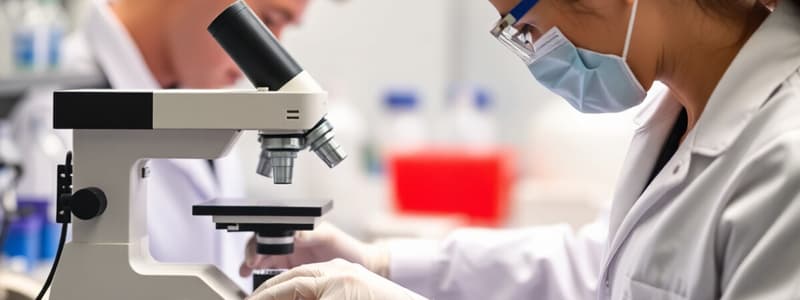Podcast
Questions and Answers
What does accuracy in laboratory testing refer to?
What does accuracy in laboratory testing refer to?
- The results being significantly different
- The results being near the target value (correct)
- The results being consistent with each other
- The ability to replicate results
Precision refers to the nearness of the results to the target value.
Precision refers to the nearness of the results to the target value.
False (B)
What is one pre-analytical variable that can affect laboratory testing?
What is one pre-analytical variable that can affect laboratory testing?
Alcohol ingestion
Why is quality control necessary in laboratory testing?
Why is quality control necessary in laboratory testing?
The Greek word 'kline' means _____ in the context of Clinical Chemistry.
The Greek word 'kline' means _____ in the context of Clinical Chemistry.
What can lead to pseudohyperkalemia?
What can lead to pseudohyperkalemia?
What is the primary focus of clinical chemistry?
What is the primary focus of clinical chemistry?
Which of the following can affect the sample level of potassium?
Which of the following can affect the sample level of potassium?
Flashcards are hidden until you start studying
Study Notes
Accuracy vs. Precision
- Accuracy refers to how close a measurement is to the true value.
- Precision refers to the consistency of measurements.
- Results may not be accurate, but must be precise to ensure both accuracy and precision using quality control.
Why is quality control important?
- Quality Control is important because:
- Expensive equipment and reagants are needed, which impacts the cost of the facility
- Patient's lives are at stake with the quality of testing
- Treating all samples as if they belonged to a relative
- Doctors rely on labs to provide accurate information
Quality Control Example: Potassium
- A hemolyzed sample can indicate hyperkalemia, even if the true value is low.
Pre-Analytical Variables that can affect lab testing
- Factors that influence the results of lab tests before analysis are referred to as pre-analytical variables.
Some pre-analytical variables include:
- Exercise and physical training
- Fasting and Food Intake
- Alcohol ingestion
- Tobacco Smoking
- Drugs
- Oral Contraceptives
- Posture
- Stress
- Circadian/Cyclical Variation (variations in the body's natural rhythms)
- Travel
- Age: Newborn, Children to Puberty, and Adult
- Sex
- Temperature
- Obesity
- Other Variables
Pseudohyperkalemia
- Falsely elevated potassium levels.
- Pre-analytical variables can cause this, such as hemolysis.
What is Clinical Chemistry?
- Clinical chemistry utilizes the principles of chemistry to study human body fluids and samples.
- The term "clinical" comes from the Greek word "kline," meaning "bed," referring to bedside medicine.
- Clinical chemistry is considered a basic science.
Studying That Suits You
Use AI to generate personalized quizzes and flashcards to suit your learning preferences.




